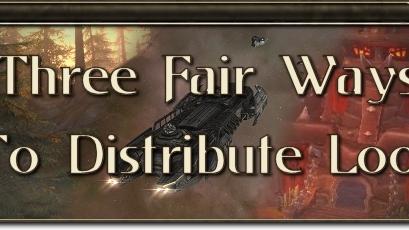scammers
Latest

Google sues scammers that allegedly released a malware-filled Bard knockoff
Google is suing a group of scammers that released an “unpublished” version of its Bard AI software that was riddled with malware. The perpetrators are believed to be based in Vietnam.

Facebook demotes video clickbait posts to improve your feeds
In a bid to promote "authentic communication," Facebook will now demote clickbait stories that present static images as video along with images with fake playback buttons in them. While the former practice just ends up confusing users, the latter actually tricks people into clicking through to a website. Both techniques are frowned upon by the social network, which says it wants to "improve the integrity of information on Facebook."

TalkTalk admits attackers stole customers' personal details
TalkTalk has enjoyed its fair share of positive press in recent months, thanks to its new carrier deal with O2 and the acquisition of Blinkbox Movies, but there could be some rougher times ahead. In an email to customers, the quad-play provider confirmed that it was the target of an intrusion at the end of last year, which saw attackers steal personal data including names, addresses, phone numbers and TalkTalk account numbers. The company says that it has confirmed a number of cases where scammers have used that information to tease more sensitive details like bank account and credit card numbers from customers.

The Daily Grind: Do you see more saints or jerks in-game?
Well, this will certainly be an extremely subjective topic today, but I say we embrace it! We've all heard and experienced horror stories with players who are extreme jerks in MMOs, from the mouthy trolls in general chat to the scammers out to fleece your hard-earned goods. But are there equal or perhaps greater numbers of generous, kind players whose good deeds don't make the headlines or leave us steaming for hours? Personally, it's really hard to say. The jerks can be really vocal and noticeable, which may make them seem proportionally larger than they really are. The saints can't be doing all sorts of nice things on a one-on-one basis that go virtually unnoticed by others. I see a lot of jerks in PUGs and a lot of saints while leveling in PvE, and I'd like to believe that there are more of the latter than the former. What do you think? Every morning, the Massively bloggers probe the minds of their readers with deep, thought-provoking questions about that most serious of topics: massively online gaming. We crave your opinions, so grab your caffeinated beverage of choice and chime in on today's Daily Grind!

MMO Mechanics: Three fair ways to distribute loot
I mentioned last week that players throw their precious characters into the MMO meat grinder in the pursuit of higher levels, new achievements, or shinier gear. We gladly jump on the seemingly endless PvE treadmill, cranking up the speed with each new patch in an attempt to catch the dangling carrot of character perfection. Of course, we don't just punish ourselves like this to say we overcame some previously impossible challenge; there's shiny new loot to be had! The best booty usually comes from completing group activities like dungeons and raids, but not everyone can agree on how to share the spoils of joint pursuits. Several different loot distribution methods have been devised over the years to solve the problem of fairly distributing the swag, with most methods starting life as player-made agreements that weren't officially supported by hard-coded game mechanics. Players have long since rolled for gear or took turns to claim items round-robin style, leading developers to implement the most popular methods as actual game mechanics to avoid ninja-looting and then the inevitable public pity parties associated with player-led arbitration. In this edition of MMO Mechanics, I'll break down three of the most equitable loot distribution systems used in MMOs today and look at why this age-old problem doesn't have a one-size-fits-all solution.

Apple cracks down on app-ranking manipulation
Apple's facing a growing problem on its App Store platform: ranking manipulation. While a lot of the spotlight areas are curated by humans, the rankings are generally not. Instead, computer-driven algorithms determine where each app falls in the various rankings for the store and each section. Ranking position can often mean the difference between making or losing money for a lot of developers. As a result, there are ways for developers to manipulate those rankings, ranging from the generally acceptable (asking customers to rate the app highly if they like it), to the not-so-much (hiring networks of computers to log in and download or leave ratings for an app). Some of this manipulation is essentially an open secret for developers. In fact, there are even companies devs can hire (again, some more credible than others) that will promise a certain ranking or claim to improve sales. It's been a constant challenge for Apple to crack down on devs who are using unsavory techniques without interfering with those employing acceptable means. More than a few innocent apps have been caught in the crossfire, either by being banned from the App Store for behavior they say they didn't do, or by having their rankings hurt by changes in the algorithm. As this long GamesBeat post says, Apple's methods for determining rankings aren't clear at all, and that fact can hurt developers. There's no easy way out of this one. Apple wants to keep its algorithm hidden, just to try to keep the rankings as objective as possible. But there will always be devs who try to crack it open, and companies ready to prey on the App Store rules to scam a few bucks from hopeful developers. In the end, the best way to climb the rankings is to have a great and popular app. People will always try to dodge that requirement, and Apple will continue to try to stop them, with good and bad results. But for developers with talent and the knowhow to make good, noticeable apps, the hope is that the App Store will always find a way to get them seen (and bought) by consumers.

Reminder: Watch out for Mists of Pandaria beta invite scams
Email notifications for the Mists of Pandaria beta have started arriving in people's inboxes -- and this means that we'll likely see an upswing in beta invite scams, as well. If you have received an email stating that you've been invited to participate in the Mists beta, be aware of the following: Don't click any link in the email. Blizzard will never ask you for your account information via email, nor will it usually provide any kind of link to click on. Do head to Battle.net. Type the URL into your browser (don't follow a search or email link) and use the secure login on that page to log into your account. If you have been invited for the first round of Mists beta, you will see your normal World of Warcraft: Cataclysm account listed under your game accounts -- and underneath that, you will see a listing for World of Warcraft: Mists of Pandaria Beta. If you do not see a link to the Mists of Pandaria beta under your game accounts, you are not in this round of testing, and the email you were sent was a fake. The same applies with beta keys as well. If you receive a notification with a beta key, do not click on any links in the email. Go to your Battle.net account as listed above, head to Manage My Games, choose Add or Upgrade a Game, and manually enter the beta key. If the beta key works, you're in; if it doesn't work, you may have been the recipient of a fake key. Remember, any time there is a beta or a trial period for a new game, there will usually be an upswing in attempts to nab accounts, too. Keep your account safe -- and if you made it in the beta, have fun! It's open warfare between Alliance and Horde in Mists of Pandaria, World of Warcraft's next expansion. Jump into five new levels with new talents and class mechanics, try the new monk class, and create a pandaren character to ally with either Horde or Alliance. Look for expansion basics in our Mists FAQ, or dig into our spring press event coverage for more details!

Chinese scalpers use app for bulk iPhone purchases
Need to anonymously purchase and scramble a bunch of iPhones as quickly as possible after they go on sale in China? There's an app for that, but it's not what you think. MicGadget has a quick walkthrough of a Windows app in Chinese that iPhone scalpers in that country apparently use to purchase and obtain iPhones for the grey and black markets. The way it works is that a scalper sets up a series of users with this Windows app (which is mostly in Chinese as you can see above) that is preloaded with credit card and booking information, and alerts the user when iPhone sales go live, so they can snap an iPhone up as quickly as possible. I presume this is all legal in some technical fashion, or at least, even if Apple did want to prevent sales like this, it would have a hard time telling which online purchases were coming from legitimate buyers and which were from this software. There must be a fair amount of money in this as well -- the person who posted pictures of this software apparently wanted to hire more workers to buy these iPhones for him or her. And this is exactly the kind of tool that caused such a frenzy at the recent Hong Kong iPhone 4S sale. Apple is continuing to try to meet demand in Asia, but software like this shows the company has a little way to go. This seems like a pretty simple tool, but the fact that scalpers have operations this complex at all means that there's a lot more room for Apple's official sales to grow overseas.

StarCraft II beta is live. Beware of scams!
People are getting actual StarCraft II beta invites, but that doesn't mean that all beta invites (or any other emails that look like they are from Blizzard) are real. If you got an email saying that you have been invited to StarCraft II: Wings of Liberty, don't click anything in that email. Instead take the following steps: Type battle.net into your browser (no typos) and it will go to the secure battle.net site appropriate to your region. Enter your account info. Under Manage My Games, choose Add or Upgrade a Game. Enter the Beta Key provided in the email where it says Enter Game Key. Press Add Game. If you are able to successfully add the game to your library, then you received a real beta invite. If the email tells you to go someplace else for the beta key or the key provided did not work, then you received a phishing email.

Scammers exploit Apple iPad fever
And now we're at the point in the iPad cycle where there's just enough information out there about it that people are interested, but not enough that they can discern credible information from scammers. That's the report of the BBC, which says that "hi-tech" scammers are using iPad-based searches to prey on users and install various types of "rogue security software." The news here isn't necessarily that scammers are out there scamming people (that happens all of the time), but it's that scammers are cashing in on the iPad frenzy to do so. Then again, that's probably not a huge surprise, either: they probably always latch onto whatever the hottest search topics are, and this past week, of course, it was the iPad. In my own personal opinion, these fearmongering reports are the biggest scam of all. Even the BBC is only reporting this based on information from Symantec, and that's S.O.P. for the antivirus company: a) release a report that claims everyone is in danger and that viruses are everywhere, b) get some less-than-tech savvy journalist to believe it, and c) sell copies of your antivirus software and profit. In reality, if you click links only on trusted sites and keep an eye on everything coming in to your Mac, you don't need Symantec to tell you how to be safe. If you install "security software" that you happened to pick up while searching for iPad news, of all things, then you can't be surprised when your system gets compromised.

Authenticators back in stock at the Blizzard store
Good news for those of you who haven't yet been able to grab an authenticator -- the units are back in stock at the Blizzard store (for both the US and Canada, Australia, New Zealand, and Latin America, with the EU version available over on their store). The price remains a cheap $6.00, and this latest version features art from Starcraft II.Which, now that I think about it, pretty much confirms that it will work not only with World of Warcraft, but all Blizzard games going forward. Obviously, with Starcraft II not even in beta yet, hackers and scammers aren't exactly targeting it, but Blizzard is thinking ahead, so if you don't have the tech yet, now's your chance to pick it up (at least until they run out of stock again).And don't forget -- if you don't have an authenticator yet, but do have a compatible mobile phone, you can always pick up the Mobile Authenticator. Especially if you have an iPhone or an iPod touch, free is the way to go.

WoW Insider Show Episode 93: Avoiding the scam
Our podcast was so much fun last Saturday that we went even longer than usual -- this week instead of the usual hour, you get nearly an hour and ten minutes for your download (and all for the same low, low price of free!). Robin Torres and Lesley Smith joined Turpster and me to talk about what I did at E3 last week (meeting Michele Boyd was definitely a highlight), the new Druid forms and how they look, what's new in the game with 3.1.3, and some recent player achievements, including Ensidia's big win, and the no-deaths character. Plus, we talked with Robin about her recent scam experience, and how you can avoid having something like that happen to you in the future. One quick note: during the show, we guessed that Blizzard would never ask you for your Authenticator passcode, but that's not true: they do require you to give it to them when you sign in on their site. But our other tips are valid: if you make sure that you're the one typing the URL in to "blizzard.com" or "WorldofWarcraft.com," then you'll never have to worry about any sneaky sites grabbing your name and password.And of course we answered your emails as usual -- if you have any movie posters to send in to us this week, you can send them along to theshow@wow.com. Enjoy the show, we'll see you next weekend.Get the podcast:[iTunes] Subscribe to the WoW Insider Show directly in iTunes.[RSS] Add the WoW Insider Show to your RSS aggregator.[MP3] Download the MP3 directly.Listen here on the page:

Live Gamer interviewed about regulated RMT
We've mentioned a company called Live Gamer in the past here at Massively. Essentially, Live Gamer is attempting to legitimize real money trading (RMT) in virtual spaces, by partnering with game publishers to create a regulated secondary market for item sales and trades. The goal is to integrate RMT with MMOs and virtual worlds and usurp the myriad gold spammers and scammers currently plaguing most virtual spaces that feature economies. Suzie Ford at WarCry recently interviewed Live Gamer Founder and President Andrew Schneider about how the company plans to change a $2 billion industry presently dominated by the black and grey market. The interview touches on the company's background, how the Live Gamer service works, and overall how they handle some of the polarizing issues of RMT in MMOs. Check out the full interview with Andrew Schneider over at WarCry for a brief overview of what Live Gamer is about. Does the prospect of having a legitimate, regulated secondary market for avatars, virtual items, and currency in your MMOs seem like a step in the right direction?

Scammers are betting you don't know a "vv" from a "w"
Scammers never stop trying, do they? They're always out there coming up with new and interesting ways to part players from their World of Warcraft accounts. Most recently, a European scam has set itself up by registering the domain www.vvovv-europe.com (currently, it's just redirecting to the main page), as opposed to the genuine EU site, www.wow-europe.com. (It shouldn't surprise us, then, that there's also a www.vvorldofvvarcraft.com -- but it hasn't been spotting using its domain for e-mail scams.) That's right, they've replaced the w in the authentic domain with a pair of v's. And while the difference is painfully obvious on a site like WoW Insider that uses a serif-style font, most browsers use a sans-serif style for their address bar in which the two v's look almost exactly like a w. (They're a bit wider than a normal w, but it's not a difference you're likely to notice at a glance.) So be extra careful of incoming e-mails that might try to convince you an e-mail from vvovv-europe is the real thing -- and remember, Blizzard will never ask you for your password! [Thanks, Jon]




